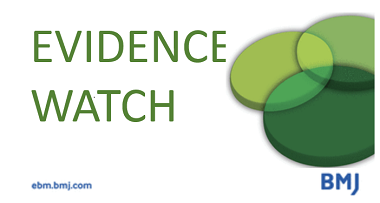In a recent trial calcium and vitamin D treatment elevated the risk of precancerous polyps nearly fourfold – but does this result matter?
Carl Heneghan
 If you weren’t observing carefully, you likely missed this study, I did. A recent randomised trial participants with one or more adenomas received daily calcium, vitamin D3, both or neither for 3 to 5 years.
If you weren’t observing carefully, you likely missed this study, I did. A recent randomised trial participants with one or more adenomas received daily calcium, vitamin D3, both or neither for 3 to 5 years.
Serrated polyps were diagnosed in 27.5% of the participants during treatment and 29.7% during the observational phase. In the treatment phase, there was no effect of supplementation on the incidence of SSA/Ps, however, in the observational phase – 6 to 10 years after supplementation began – calcium and vitamin D treatment elevated the risk nearly fourfold (RR3.81, 95%, |CI 1.25 to 11.64),
Sessile serrated adenomas or polyps (SSA/Ps) are precursors for cancer and its possible that calcium and vitamin D supplementation are contributing to the risk. But answering the question as to whether they cause disease is seemingly not straightforward.
A recent trial in JAMA suggests there are benefits in preventing advanced colorectal adenomas with vitamin D3 supplementation, whereas other trials indicate it does not reduce the risk. A 2016 systematic review, including four trials reported a modest chemopreventive effect of calcium supplements against recurrent colorectal adenomas.
The results of a Cochrane review of Vitamin D supplementation for prevention of mortality in adults, Identifying 59 randomised clinical trials, don’t help to remove the confusion. The review concluded that because of ‘bias originating from substantial dropout of participants and of outcome reporting bias due to some trials not reporting on mortality, as well as some other weaknesses in our evidence, further placebo-controlled randomised trials seem warranted.’
It gets even more confusing if you read the read the Cochrane review on Vitamin D supplementation for prevention of cancer in adults. This review concludes there is no firm evidence that vitamin D supplementation decreases or increases cancer occurrence in predominantly elderly community-dwelling women.
Cancer usually starts as a polyp, which grows very slowly – they can take up to 20 years to form; those who have ever had precancerous serrated polyps or smoked are more at risk. Therefore should you avoid taking calcium and vitamin D supplements? Based on the evidence to date, we don’t know: more research needed then!
Reference
Vitamin D Receptor Genotype, Vitamin D3 Supplementation, and Risk of Colorectal Adenomas: A Randomized Clinical Trial. Barry EL, et al. JAMA Oncol. 2017 May 1;3(5):628-635. doi: 10.1001/jamaoncol.2016.5917.
BMJ Evidence-Based Medicine – original evidence-based research, insights and opinion
Read more in the Welcome to BMJ Evidence-Based Medicine Editorial.

Competing interests
Carl has received expenses and fees for his media work including BBC Inside Health. He holds grant funding from the NIHR, the NIHR School of Primary Care Research, The NIHR Oxford BRC and the WHO. He has also received income from the publication of a series of toolkit books. CEBM jointly runs the EvidenceLive Conference with the BMJ and the Overdiagnosis Conference with some international partners which are based on a non-profit model.